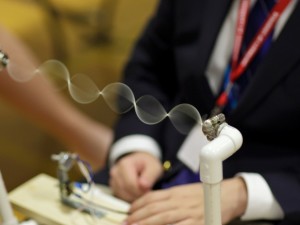
This is the third post in a series of posts focused on science fair. In the final part of this series, I will talk about my experience at the biggest stage for young scientists. Today, I’ll give some steps in presenting and winning at a science fair competition.
Science fair can be seen as a co-curricular activity, something that complements the subjects taught in school. Thus, a science fair project is a great opportunity for students to practice the science they’ve been taught and conduct experiments using the scientific method. After spending their school year working on their projects and research, students like to be recognized for the work they do and decide to compete in science fairs.
Science fairs are a collection of determined young scientists. Older scientists often remark that these students are practicing science on a higher level. With all these great projects, how can the judges determine a winner? The judges have improved their ways of selecting projects or removing projects for the potential winners. Here are some tips in order to be considered for the final judging:
Before the fair:
- Follow the Scientific/Engineering Method when conducting your experiment.
- One of the biggest things judges look for is whether the student followed the scientific method. This includes formulating a question, coming up with a hypothesis, determining a methodology, running an experiment, and drawing a conclusion based on your results. In the previous blog post, I talked about these methods when selecting your project.
- Run many trials and experiments; use statistics to back up your results.
- Doing your research is great but statistics are needed to validate your results.
- Statistics are needed in higher level projects, such as in high school competitions.
- Reach out and talk with a statistician, either at your school or at a local university.
- Describe the results you will collect and see what type of statistics you should run during your result collection.
Preparing a Presentation:
- There are plenty of people who decide to “wing” their presentations to judges. The benefit they see is the saved time; however, they can’t see the harm that they’re doing and they risk being unprepared when a judge comes around. Don’t wing your presentation!
- It is important to – at minimum – sketch an outline of your presentation or the order you want to present your topics. Also, find the important subjects you want to cover, and make sure to emphasize them when presenting.
- Creating a script to present with can be dangerous. If you use a script, you may become reliant on it. If you accidentally forget a line from the script you’re relying on, that can lead to a disastrous situation.
- At the beginning of the fair, try to keep your presentation a mix between a script and non-script. As the day progresses, you’ll know what things are good to say and what things are not good to say. Presenting more and more will you help you practice your presentation until you’re comfortable with it.
- One of the scariest parts of the presentation is the questions that judges ask.
- When answering questions, always keep a positive attitude, and don’t dwell too long on any shortcomings in your project.
- Highlight the positive aspects of your answer, not the negative ones.
- Determine what message you want to portray as you present your project
- Think of three to five key points that will portray that message.
- Example: The device that I engineered is five times better than what’s on the market.
- Think of three to five key points that will portray that message.
- After responding to a question, talk about a key point and convey the message to the judges. The whole presentation should be about presenting this message, and that message should show how important your research is to the world.
- Look at rubrics for other science fairs (those rubrics can be found online). Prepare your presentation to address those categories. If your presentation doesn’t include a topic from the rubric, be prepared to answer a question about it.
- When answering questions, always keep a positive attitude, and don’t dwell too long on any shortcomings in your project.
- Throughout your presentation and especially in your conclusion, highlight the applications your research has. Why is the product of your research important? How can this be improved? Those are the type of questions the judges will want answered when you present your conclusion.
- Example: A battery has applications in the consumer, military and medical fields. This makes the battery very important, and why this project is important.
Day of Fair:
- Eat a nice breakfast, something to give you energy for the long day at science fair. Bring a water bottle or something else to help your throat if it hurts after talking for a while.
- Dress nicely.
- Bring extra copies of any papers or forms with you to the fair. If you constructed a poster board, supplies to fix it in case it gets damaged is something you should bring.
- When waiting for judges to arrive at your project, avoid walking around and visiting the booths of friends. You don’t want to risk the chance of a judge walking to your project when you’re somewhere else.
- While waiting during the day, do something productive, such as practicing your presentation. You can practice presenting to your neighbors. The more feedback you can get about your project, the better.
- Stay aware of the time limits you may have for your presentation, and make sure to leave ample time for the questions a judge may have.
- Make sure to present your important message throughout your presentation, even during the question period.
- If you ever forget what you need to say, pause for a moment and take a breath. There is no need to panic; these judges are humans as well.
After the Fair:
- If you did win an award at your science fair, congratulations!
- If you’re moving on to a higher competition, use the time to complete more experiments if needed, or make improvements to anything on your board/presentation.
- If you didn’t win, don’t worry. Talk with your science fair coordinator about other science fairs that you could apply for. Or you can start working on the science fair for next year and use the knowledge you gained from this fair.
- Talk with the science fair coordinator and see if you can receive the remarks the judges made about your project. After all, science fair is a learning experience!
In the previous blog post, I gave tips on how to pick a science fair project. Read it here!







